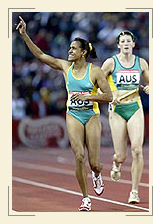|
 Cathy Freeman: the brightest side of Australia
Cathy Freeman: the brightest side of Australia
From the late 18th century, when the first British colonists settled in Australia until the early 1970s, Australia's native inhabitants were the subject of  unfavourable discrimination that led to their economic, social and political marginalization. Constituting 2% of the total population, the Aborigines live on average 20 years less and are the most vulnerable group to problems such as unemployment, alcoholism and criminal behaviour. Until recently they were the "dark" side of a country, which, since its independence (1901), has become one of the most developed societies in the world. unfavourable discrimination that led to their economic, social and political marginalization. Constituting 2% of the total population, the Aborigines live on average 20 years less and are the most vulnerable group to problems such as unemployment, alcoholism and criminal behaviour. Until recently they were the "dark" side of a country, which, since its independence (1901), has become one of the most developed societies in the world.
However, since the 1970s, and especially since the mid-1990s the policy towards the Aborigines started to change gradually. This development was to a large extent the result of lobbying action by people who defended the rights of the Aborigines and promoted the special features of their cultural identity. An expression of this tendency was the emphasis given to the civilization of the Aborigines in the spectacles presented during the opening ceremony of the Games, but also the choice of Freeman for the lighting ceremony. Ten days later, Freeman was to win her first gold medal. This was the first victory of a native in an individual event of the Olympic Games and the first gold medal for Australia in athletics since 1988.
Cathy Freeman was born on 16 February 1973, at a time when the policy to take away native children from their families had just been revised. Therefore, Freeman, as opposed to her grandmother, knew her family, her real name and the exact date of her birth. Nevertheless, the conditions of living could be characterized anything but good. When she was a child, she was often abused by her father, before he left the family. What changed her life was her ability in running. At the age of 11 she took up sport and when she was 17 she participated in the Commonwealth Games and won a gold medal in the 4x400m. Two years later she participated in the Barcelona Olympics without gaining any distinction.
Her first big distinction was in the Commonwealth Games in 1994, when she won two gold medals and one silver and waved the red, yellow and black flag of the Aborigines. It was the first time that such a thing happened. Since that moment Freeman became the symbol not only for the Aborigines but also for the majority of the Australians: 70% of the public opinion applauded her attitude.
In 1996, in Atlanta, Cathy Freeman was Australia's only hope
for a distinction in athletics. She achieved the best time
in her career, but finished second, after the French Jean
Marie Perec. In Sydney there was no confrontation between
the two athletes, due to Perec's sudden departure a few days
before the beginning of the Games. Therefore, Freeman, world
champion in the 400m in 1997 and 1999, had no difficulty in
winning. Hers was only one of the 16 gold medals that Australia
won in the 2000 Olympics. However, it was celebrated more
than any other, even more than the victories of Ian Thorpee
and the swimmers of Australia in the relay races, and that
not only because Freeman's victory was the only Australian
victory in athletics...
|